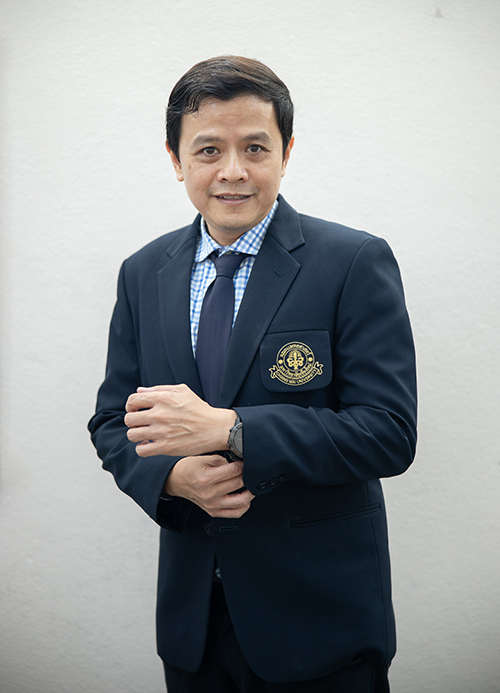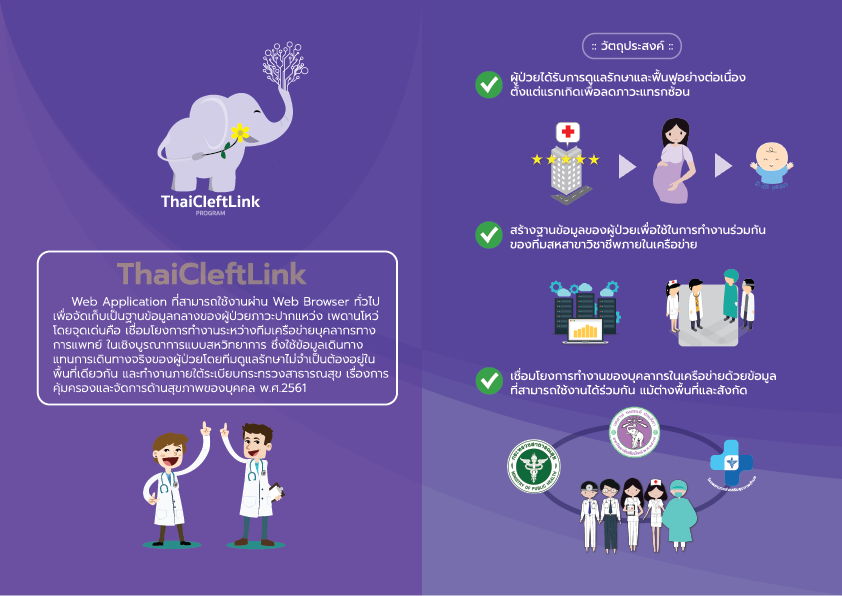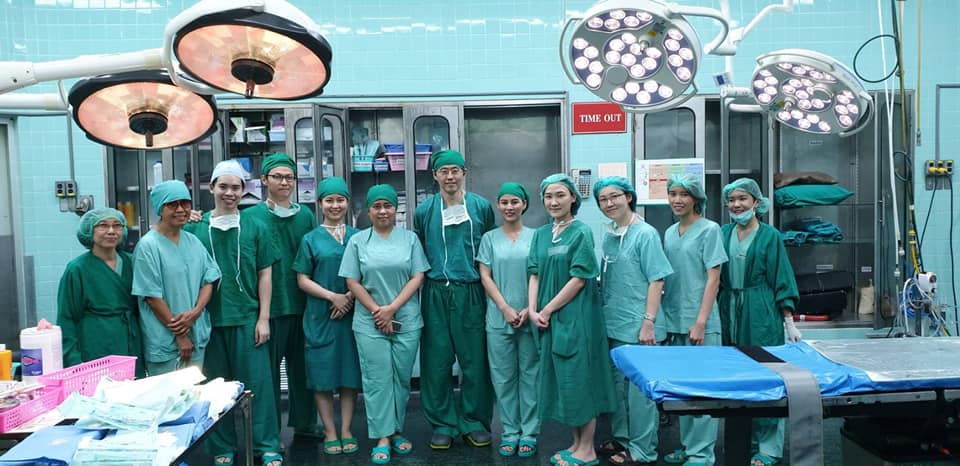Thai cleft link - used to care for Cleft Palate Patients
Chiang Mai University’s District of Excellence CARE for Craniofacial Anomalies Disease has been working for two decades on cleft lips and cleft palates.
For those born with cleft palates, it takes more than a quick operation to solve the problem. In fact, it often requires a decades-long multidiscipline approach to help a child overcome speech impediments and to gain self-confidence; requiring medical experts from speech-language pathologists to surgeons.

“The challenges are that there are many systems to oversee,” said Assistant Professor Krit Khwanngern, M.D., of the Princess Sirindhorn IT Foundation Craniofacial Center Chiang Mai University. “From the outside, there is the issue of the shapes of the lips, the nose and the mouth which can affect speech. Speech impediment issues are not the surgeon’s purview, but that of the ear, nose, throat (ENT) specialists. These specialists will then have to consult with both the speech-language pathologists and surgeons. Thailand suffers from a shortage of speech-language pathologists, in fact there are currently none working exclusively in the north of Thailand; though Chiang Mai university is currently opening a new course to rectify this shortage. For children between birth and five years old, they and their parents are pretty much going nowhere, as they will be going back and forth to the hospital constantly to practice speech. Between the ages of five and twelve, they will have problems with teeth and will also have to visit dentists frequently.”

Assistant Professor Krit Khwanngern, M.D., of the Princess Sirindhorn IT Foundation Craniofacial Center Chiang Mai University.
“There were two cases which really affected me,” said Assistant Professor Krit. “The first was an 18 year old man from Mae Chaem who told me that he had to wake up at 3am to make his 10am appointment, often having to wait or have it cancelled as doctors were stuck in surgery. After operating on him a few times I noticed that he would often cancel his appointments, saying he had to harvest rice or have other duties which didn’t fit in with our medical schedule. After we completed his surgery, I followed up on him only to hear that he wasn’t working and was at home, having not graduated from school. I realised that it was because he didn’t have the support from childhood through the process and it was just all too much for him. Another patient, 24, had had multiple surgeries and was just about to complete his treatment when he suddenly stopped. He said that he had had enough. It was too much, he said. I realised that these people felt so alone, so misunderstood and so frustrated. By setting up our centre for craniofacial disease, we hope to be able to care for people throughout the entire process.”
Chiang Mai University’s Faculty of Medicine first set up a One Stop Network service for those with cleft palate issues. In 2019, however, the Princess Sirindhorn IT Foundation Craniofacial Center Chiang Mai University was formed with the aim of helping those in need in the upper eight northern provinces. What is unique about this centre is its multidisciplinary approach, using technology and medical science to create an innovative system of support for patients in need.
“Thanks to President of Chiang Mai University Clinical Professor Niwes Nantachit, M.D., FRCP(T) Vice President Professor Pongruk Sribanditmongkol, M.D., Ph.D. the One Stop Network was elevated into a sustainable center,” said Assistant Professor Krit. “By working in conjunction with the Faculty of Engineering the Faculty of Science and the Information Technology Service Centre as well as the Faculty of Medicine, Faculty of Dentistry and the Faculty of Associated Medical Sciences, this is one of the largest cross-faculty projects in the university.”
One of the biggest problems to solve, according to Assistant Professor Krit, was overcoming the challenges required by patients to travel frequently, over a number of years, to the hospital.
“Imagine a patient having an appointment with a surgeon on the 1st of September, then one with the speech-language pathologists on the 3rd of September and another with a dentist a few days later. I understand why many would just choose not to continue, especially if they live far away in Mae Hong Son, for instance. Because each hospital’s databases are too large to merge into a national database--one hospital may be under the Ministry of Public Heath while another is under the Ministry of Higher Education, Science, Research and Innovation, both of which use different systems--it is impossible to merge databases to help patients in terms of streamlining appointments.”
The Chiang Mai University’s District of Excellence CARE for Craniofacial Anomalies Disease has therefore created the Thai Cleft Link programme, using to house patient data. From photographs of a patient through to their medical history, diagnoses, appointment schedules, as well as overall statistics for all patients, all of this information is now on one easy to use database. This is a game changer, not just for the patients, who can now schedule multiple appointments with different specialists as a cluster, but also for physicians, who now have the full medical history of a patient at a click of a mouse.
“We oversee eight networks across the eight provinces,” explained Assistant Professor Krit. “We had to merge a multitude of systems into one cohesive system to be used by each province and hospital. We had to use industrial engineering to organise and write programmes on a vast scale to create a platform with an ecosystem which is functional for all. Today I am very satisfied with the results, especially for the three upper north provinces, as it is working seamlessly and patients are really benefitting. We are now working on a Big Application, which would be even more patient-friendly.”

“My real dream,” Assistant Professor Krit shared, “is to create our own platform here in Thailand so that we don’t have to rely on the use of international platforms such a Facebook, Twitter. Currently the database is hosted here in a Chiang Mai server, but this model can be replicated anywhere in the country. I would like to see a Thai Cleft Link Big Application, like a Grab or Agoda, which will be an ecosystem IT platform.”
Assistant Professor Krit admits that as a physician, he is no data or application expert. But because he saw a problem that had to be solved, and he reached out to work with other experts in their fields to find a solution, untold number of patients across Thailand will have a better life and better health.

“Chiang Mai University has really been pushing us to look at the bigger picture,” explained Assistant Professor Krit. “Instead of just working as a surgeon, we now see the entire needs of a patient and can respond to all their needs, not just one at a time. Like a wave, from the university, through its faculties, and with real results for patients. We are not just physicians; we can actually be a part of caring for society as a whole.”